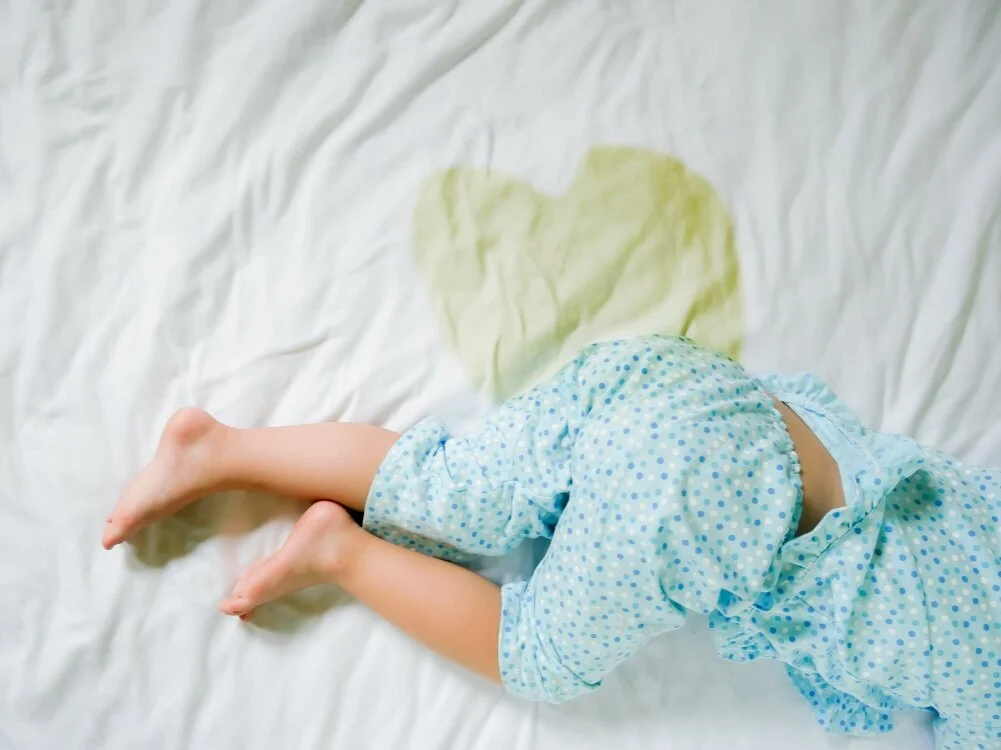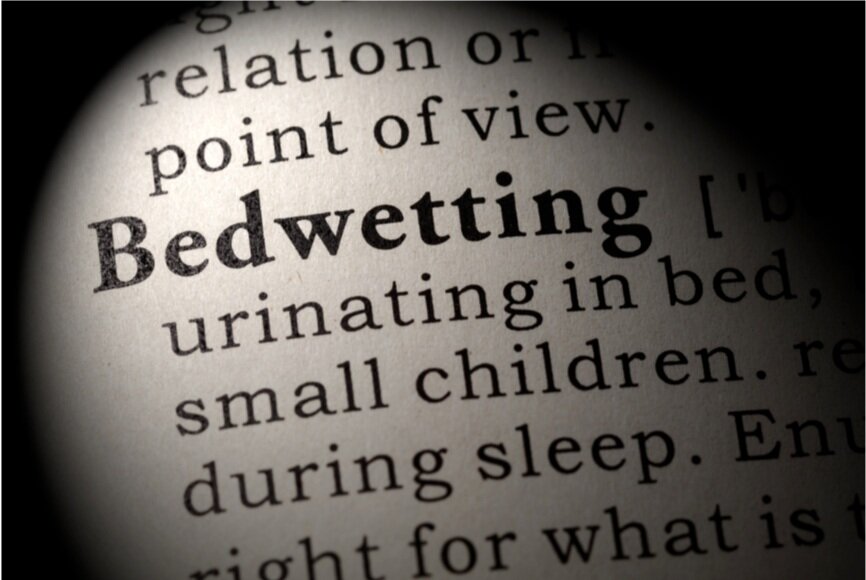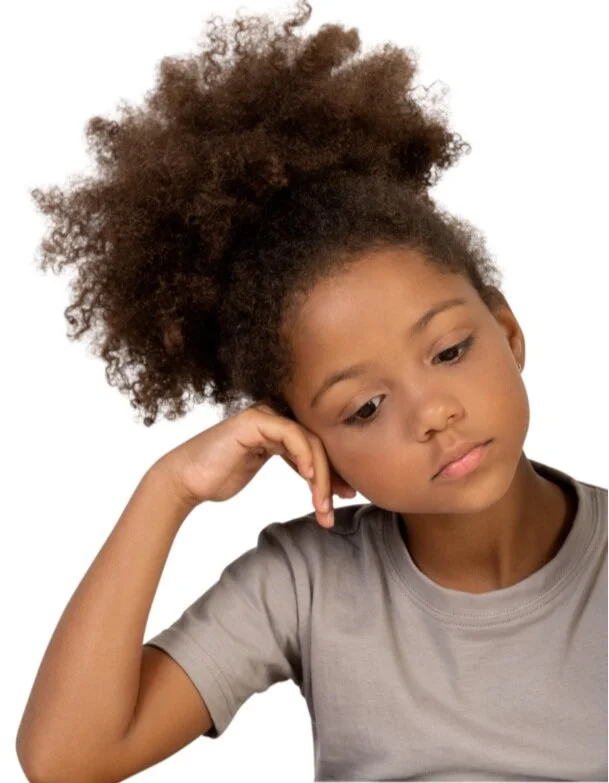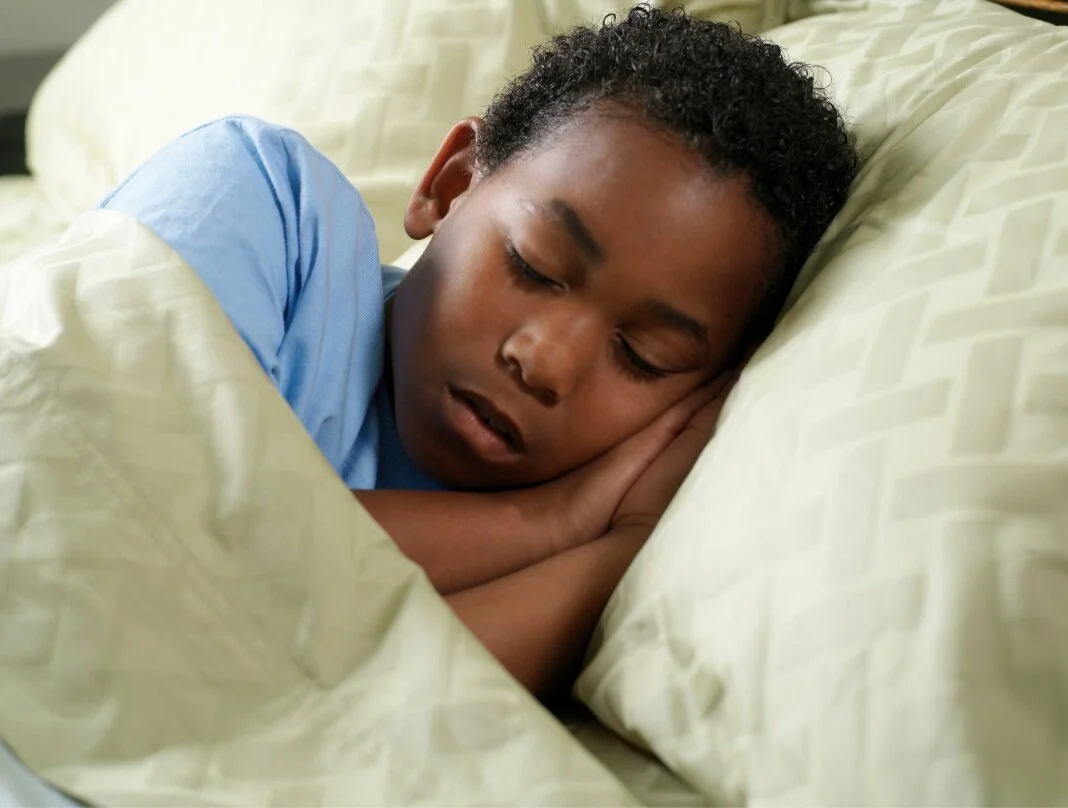Peeing in the Bed: More Than Just Too Much To Drink
I know. You have gotten to that point in parenthood where you have progressed from changing diapers every 2-3hrs, to potty training, and believe you’re home-free.
And then, at 2:37 am -it’s always some random early morning hour when we are finally at that pre-parent level of sleep that we’ve craved since their beautiful lives entered this world- you feel a tap, it’s that marvelous being you created, letting you know that you must now rise from that delicious rest because they have pee’d in the bed.
Although those wee-hour mornings stumbling, half-asleep, changing wet sheets, and wet pajamas are frustrating, it’s a natural transition in life for our children. However, bedwetting can be a sign of other conditions that require you to follow-up with your child’s doctor. So, let’s go there.
What is bedwetting?
The medical term for bedwetting is enuresis (en-u-ree-sis), and its defined as involuntary urination at night time. There are various classifications for bedwetting that are outlined below.
Diurnal- involuntary wetting during the daytime.
Nocturnal-involuntary wetting during the nighttime.
Primary Enuresis- the child has never stopped peeing on themselves OR was dry for only a short period of time.
Secondary Enuresis- the child that was dry for at least six months and relapsed.
Approximately 20% of 5-year-olds, 10% of 7-year-olds, and 5% of 10-year-olds may still wet the bed.
What Causes bedwetting?
The American Academy of Pediatrics has a long list of reasons for bedwetting. These are a few that I’ve encountered in practice:
The child has not fully learned how to hold and empty urine well. (Communication between the brain and bladder may take time to develop.)
The child is a deep sleeper and does not awaken to the signal of a full bladder.
The child is constipated. Full bowels can put pressure on the bladder and lead to problems with holding and emptying urine well.
The child has a minor illness, is overly tired, or is responding to changes or stresses going on at home.
The child is found to have a more serious health condition.
How do you manage bedwetting?
Don’t blame or get angry, it is not their fault.
Be sensitive to your child's feelings. Don’t make it a big issue.
Protect the bed with a plastic cover under the sheets. This protects the mattress from getting wet and smelling like urine.
Let your child help clean the wet sheets and covers. AAP maintains, “this teaches responsibility. It can also keep your child from feeling embarrassed if the rest of the family knows.” However, don’t make this a punishment; it only promotes shame and embarrassment.
Do not let family members, especially siblings, tease your child.
Avoid drinking large amounts of fluid 1-2hrs before bedtime.
Have your child use the toilet before bedtime.
Have your child wake-up 1 to 2 hours after going to sleep to help your child stay dry through the night.
Reward your child for dry nights. Offer support, not punishment, for wet nights.
Be aware of your child's daily urine and bowel habits.
Bedwetting alarms
Your child’s doctor may recommend a bedwetting alarm if it persists for 1 to 3 months. They are successful 50% to 75% of the time. Ask your child's doctor which type of alarm would be best for your child.
Medicines
There are medicines available to treat bedwetting for children 6 years and older, but they do not cure bedwetting. They have been found to be helpful when children begin attending sleepovers or overnight camps. Ask your child's doctor about these medicines and if they are right for your child, especially if there are any side-effects.
When should you go to the doctor for bedwetting?
Bedwetting can be an indication that there is something more concerning going on with your child’s health and requires intervention from your child’s doctor.
Bedwetting can be a symptom of urinary tract infections, chronic constipation, diabetes, sleep apnea, and even trauma and stress, to name a few.
Schedule an appointment with your child’s doctor if their bedwetting is related to any of the following:
Changes in how much and how often your child urinates during the day
Pain, burning, or straining while urinating
There is a narrow stream of urine or dribbling that is constant or happens just after urination
Your child’s urine is cloudy or pink, or there are bloodstains on underpants
Your child is peeing during the daytime and nighttime
Sudden change in personality or mood
If your child snores loudly and needs to be repositioned to keep sleeping
Significant bowel control ( unable to control or unable to go)
Urinating after stress (coughing, running, or lifting)
Certain gait disturbances (problems with walking that may mean an underlying neurologic problem)
So hang in their mamas and daddies. They will outgrow this, and until they do, they will need a lot of emotional support.
May this always be where all the children are well.
Have you had to support your child through bedwetting? Comment below. I’d love to hear from you.
References
American Academy of Pediatrics. (2013, September, 6). Bedwetting. https://www.healthychildren.org/English/ages-stages/toddler/toilet-training/Pages/Bedwetting.aspx
Apos, E., Schuster, S., Reece, J., Whitaker, S., Murphy, K., Golder, J., Leiper, B., Sullivan, L. & Gibb, S. (2018). Enuresis Management in Children: Retrospective Clinical Audit of 2861 Cases Treated with Practitioner-Assisted Bell-and-Pad Alarm. The Journal of Pediatrics, (193), p 211-216, doi.org/10.1016/j.jpeds.2017.09.086.
Escoto, M. (2018, December). Bedwetting. KidsHealth. https://kidshealth.org/en/parents/enuresis.html?ref=search
Grzeda MT, Heron J, Tilling K, et al. (2017). Examining the effectiveness of parental strategies to overcome bedwetting: an observational cohort study. doi: 10.1136/bmjopen-2017-016749
Jain, S. & Bhatt, G. (2016) Advances in the management of primary monosymptomatic nocturnal enuresis in children, Paediatrics and International Child Health, (36)1, p7-14, doi: 10.1179/2046905515Y.0000000023
Sarici, H., Telli, O., Ozgur, B., Demirbas, A., Ozgur, S. & Karagoz, M., Prevalence of nocturnal enuresis and its influence on quality of life in school-aged children, Journal of Pediatric Urology, (12)3, p159. https://doi.org/10.1016/j.jpurol.2015.11.011.
Vande Walle, J., Rittig, S., Tekgül, S., Austin, P., Yang, S., Lopez, P. & Van Herzeele, C. (2017). British Journal of General Practice; 67 (660): 328-329. doi: https://doi.org/10.3399/bjgp17X691337




